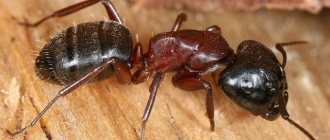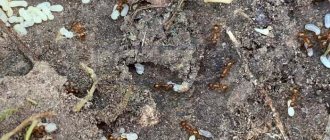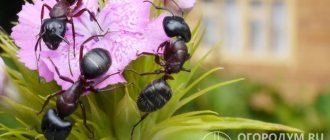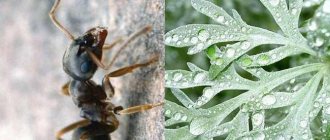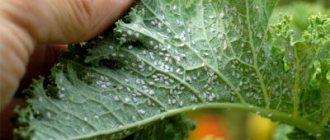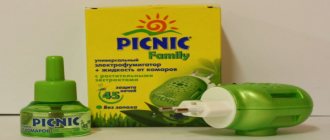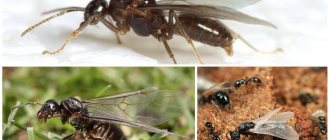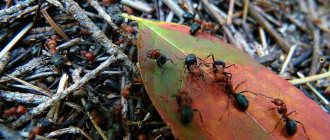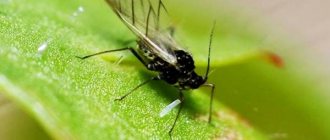Ants have a very developed sense of smell. Description of the most productive plants that ants are afraid of. Methods of using herbs, flowers, vegetation to control insects. Will folk remedies replace professional pesticides?
Ants, like most insects, cannot tolerate certain aromas of vegetation, which is why many owners of dachas and suburban areas, gardens, have adopted a method of fighting arthropods with the help of herbs. Thanks to the repellent properties of plants, you can do without the use of chemicals that can harm humans.
Smells are a safe, affordable and effective method that can be used both in open areas and indoors. Let’s take a closer look at what plants ants are afraid of.
Types of ants
House ants and forest ants are two different types of insects that differ in size, feeding methods and habitat. The red species living in the forest are hard workers who build large anthills and destroy forest pests; they have a size of 4-9 mm. Domestic aliens are very small, barely growing to 3 mm, which can settle anywhere in the house, but have nothing to do with their forest brothers.
On a note!
These 2 types of ants also differ in character: forest dwellers, defending their nest, may well bite a person or an animal that disturbs their peace, but domestic ones do not bite at all.
Black ants or garden ants are pests that cause a lot of trouble for gardeners. They settle on some plant along with aphids, which they use for their food. After some time, the plant affected by aphids dies. Therefore, all gardeners and gardeners will have to protect their plantings from such pests so as not to lose their harvest. Knowing which plants garden ants don’t like, this is within everyone’s power.
Types of ants
Efficiency of the technique
Many believe that the use of traditional environmentally friendly methods of pest control is an ineffective measure. But experienced summer residents and gardeners say the opposite. Proper planting of a natural repellent against other vegetation is an excellent chance to absolutely secure the area. It is important to understand how to properly combine herbs and berries and fruit plants.
Many of the above-mentioned plants and flowers allow you to attract predatory insect species to the territory. Because of this, it is possible to clean the area from several types of pests, eliminating the need to use chemicals.
Yes, industrial poison will quickly deal with parasites - two or three days will be enough, but, unfortunately, this technique can cause harm. Toxic components are absorbed into the soil, which is dangerous for crop yields and environmental conditions.
Grass and flowers have a mild effect, so ants will not leave the fragrant area so quickly. But a negative impact has been ruled out, which has become the reason for the increasing frequency of summer residents and gardeners turning to natural repellents and folk remedies. Now you know whether ants are afraid of odors and whether they live in conditions of the fragrance of plants that are unpleasant to them.
Methods of protection
Ants play a large role in the natural ecosystem; their destruction will not benefit either humans or plants. Therefore, various methods of protection should be used that will create unbearable conditions for insects so that they leave on their own.
There are the following methods to protect the plants on your site and your home:
- the use of plants whose smell ants cannot stand;
- repelling them with essential oils;
- food use.
What harm can ants cause?
In small quantities, representatives of the ant family are beneficial. They loosen the soil, promote the decomposition of plant residues and regulate the level of soil acidity. But, everything is good in moderation, and if a large colony of ants is located in a small area, serious problems may arise:
- destruction of plant root systems;
- excessive soil oxidation;
- spread of aphids on the site;
- harming buds, flowers, fruits and berries.
Beneficial ants in the garden become pests.
Protective plants
Ants do not like the smell of many strong-smelling plants, so this environmentally friendly method will allow you to drive them away from the territory by planting the following flowers and herbs in the garden plot or laying them out in dried form:
- marigold flowers and lavender;
- lemon balm, mint, valerian;
- nasturtium, rosemary;
- potato;
- dill, parsley, mustard and cilantro;
- anise, fennel.
Many gardeners use fragrant plants, planting them around the perimeter of the plot; you can plant mint or marigolds to protect against aphids and ants in the rows of the garden. You can also make decoctions from these herbs, and then spray them on insect sites.
Important!
It should be remembered that the herbal smell is unstable, so treatment of plants with decoctions should be repeated quite often, and the dried bunches should be changed periodically.
In your home or dacha, you can drive away domestic aliens by placing bunches of dried herbs in the room and in cabinets. Lavender flowers and mint will not only repel ants, but will also create a pleasant aroma in the room.
Plants against pests Some plants that are useful for the garden are planted in the trunks of fruit trees: valerian, mint or marigolds will not only drive away insects, but will also be used by their owners as medicine. Wormwood is used in the same way against ants.
As recommendations
1. “Folk remedies” for fighting ants are simple, safe, affordable and at the same time effective ways to control the number. In addition, the cost of making traps is minimal. The only thing you need is time and patience.
2. If you cannot fight with “folk remedies,” you should not delay time and allow the number of insects to reach a critical level. Often, “folk remedies” for fighting ants do not give the desired result. Then the “heavy artillery” is used - chemical pesticides.
3. Ants cannot be eliminated completely; they are unique insects from the point of view of ethology, ecology and physiology, which have a hierarchical system of organization. Because ant colonies are highly adaptable, controlling their numbers is a matter of controlling local populations rather than eliminating entire colonies.
4. While getting carried away with the fight against ants, it is important to remember that you cannot completely destroy ants in your garden plot. Ants perform many ecological functions that are beneficial to humans, including regulating the number of insect pests (they eat butterfly caterpillars and sawfly caterpillars), and aerate the soil
Sources
- https://apest.ru/muravi/vse-o-muravyah/chego-boyatsya-muravi/
- https://GdeKlop.ru/muravi/primenenie-rastenij/
- https://deziplan.ru/muravi/sredstva-ot-muravev/kak-izbavitsya-ot-muravev-v-domashnix-usloviyax.html
- https://KlopVred.ru/muravi/kakie-rasteniya-boyatsya-muravi/
- https://1gai.ru/baza-znaniy/525455-22-rastenija-kotorye-pomogut-zaschitit-sad-ot-vreditelej.html
- https://zen.yandex.com/media/rad/kakie-rasteniia-otpugivaiut-klescei-komarov-muh-i-prochih-nasekamyh-5ef81acb54cae04d0bb759ac
- https://zen.yandex.com/media/geradez/rasteniia-kotorye-otpugnut-muravev-5deb7eceaad43600ad6a1b41
- https://gardenerschool.ru/ogorod/rasteniya-kotorye-ne-lyubyat-zolu.html
- https://stop-pest.ru/narodnye-sredstva-borby-s-muravjami/
[collapse]
Repelling with essential oils
Knowing that ants are afraid not only of odorous plants themselves, but also of strong odors, you can use aromatic oils to effectively combat them:
- lavender, mint;
- cedar, pine or juniper oil;
- anise, cinnamon.
This method is rather preventative, allowing you to prevent ants from entering the premises of your house or apartment. To repel with essential oil, treat all doors and windows, as well as ventilation openings; you can also spray the floor with a mixture of essential oil and water using a spray bottle.
Essential oils for ants
On a note!
At the same time, the owners of the house will successfully provide themselves with aromatherapy sessions, which is beneficial for the nervous system and strengthening the immune system.
Repellent Products
One of the foods that ants are afraid of is garlic and its tinctures. They are recommended to be used in the garden, rubbing tree trunks, and in the house.
Other foods that repel ants and aphids:
- Cut onions and garlic are laid out in the house and on ant paths; the infusion of onion peels can be sprayed on the plants.
- Vinegar and essence are used to expel ants from cabbage beds, from the premises of a summer house or home: vinegar is diluted in half with water and ant paths and nests are treated with the solution. Insects do not like the pungent smell, and they leave the home.
- Freshly brewed coffee, or rather its extraction, can be placed near garden plants to repel ants.
- Cinnamon, ground red pepper - used in ground form, placed in insect habitats, or added to herbal decoctions.
- Sunflower oil (preferably unrefined) - what ants in the house are afraid of is the smell of vegetable oil, so it can be used to combat uninvited guests, however, the disadvantage of this method is the presence of greasy stains in the house.
- Millet - the reason why ants don’t like it is unknown, however, by pouring millet into an anthill, you can definitely get rid of them.
Ant Control Products
Acetic acid as an alternative to vinegar
Are ants afraid of acetic acid? Acid will drive away and destroy ant colonies faster than table vinegar.
Author's note
Be careful when using acid. Inhalation of vapors is harmful to the respiratory tract. Acid contacting the skin causes burns.
Proportions
Use the acid in diluted form:
- 1 part essence + 3 parts water.
- 1 part acid + 2 parts water.
Usage
- Fill the mixture into a spray bottle.
- Spray the redheads on the paths, so they will spread the smell on themselves. They themselves will die and others will be driven away.
- Treat the settlement together with the queen.
- Cover the anthill with film.
- Repeat spraying after 2 days.
Folk methods of struggle
Many summer residents and gardeners have tried various folk remedies for ants on their plots:
- To drive them away from the garden area, you can sprinkle ant paths and use the following substances: wood ash and soot, tobacco dust, coarse salt, ground cinnamon, red pepper, mixtures of ash, lime and crushed tree bark.
- The most humane way to clean an anthill is to shade it, which is successfully used for small settlements. Insects build their homes in warm, well-lit areas to warm their pupae. Therefore, by arranging dense shade and blocking access to the sun, you can force the ants to move to a sunnier place.
- To remove an anthill from the territory of a dacha, some recommend completely digging it out with a shovel and moving it to the forest. The same method helps get rid of ants in the cemetery. Others advise driving out insects using the head of a smoked herring, which is placed on the ant house.
- Another way to move an anthill is using a solution of molasses, sugar or jam in the ratio of 1 glass of sweets per bucket of water. The solution is poured into the anthill, and the insects leave. This is explained by the fact that sweet water causes the proliferation of yeast fungi that infect ant reserves. Insects have to look for another place to live.
- An existing anthill can be doused with boiling water and then carefully dug up to destroy the nests, then the ants will go to a quieter place.
- To protect plants from harmful insects, trapping belts are made - they wrap the trunks with foil in the form of a skirt with sharp edges, through which ants cannot climb, or with double-sided tape.
Folk remedies for insects
Prevention methods against ant infestation
Experienced gardeners recommend regularly digging up the soil in the area, destroying small settlements of ants. They will not like to build their nests when they are frequently disturbed, so the ants will go off to look for other places.
Knowing what kind of grass ants are afraid of, it is recommended to grow it in your garden between plantings to protect them from pests.
Around the vegetable garden, garden plot and house, you can plant repellent plants around the perimeter, which were described above, or treat them with herbal decoctions.
To prevent ants from entering your home, you should adhere to basic hygiene rules:
- Clean the kitchen regularly;
- do not leave food on the table, and wipe food stains thoroughly;
- all jars and bottles of sweet products (honey, jam, syrup, etc.) must be washed immediately;
- store food in airtight containers;
- use a soap solution to treat all surfaces and kill insects;
- To prevent insects from entering the house, they also use a vinegar solution, periodically wiping all window sills, tables and baseboards with it, repelling pests with the smell.
